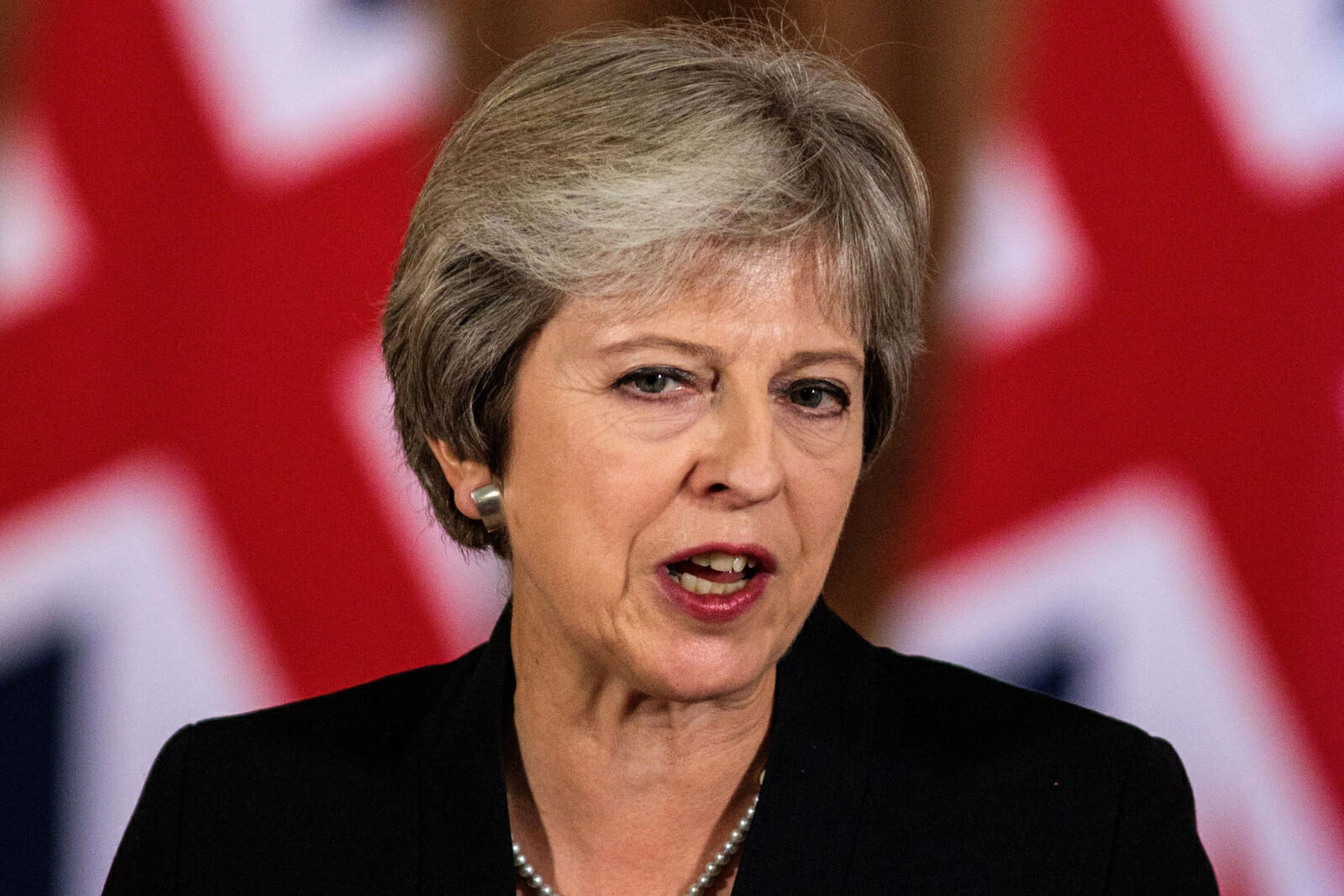
Understanding the Latest Brexit Double-Speak
Politicians and journalists have got themselves so tied up in their own spin of Brexit that they are using terms in opposition to their meaning, as in George Orwell’s novel 1984, where the Ministry of Truth declares war is peace and peace is war.
First point: Prime Minister Theresa May offers false choices. Usually, these false choices are reduced to two: her proposed Withdrawal Agreement (WA) – which she mischaracterizes as a “deal”; and leaving the EU as legislated on 29 March, which she mischaracterizes as “no deal,” “crashing out,” and “falling off a cliff.” Her false choice is deal or no deal. British democracy now sounds like a bad game show.
In fact, her WA is not a deal to leave the EU, but is, at best, an indefinite “transition,” disguised as nominal separation, while she works out something to replace it, for which she still has no policy.
What she pretends is “no deal” actually would be Brexit. That is what people voted for (“leave the EU”). Leaving with or without a deal, with or without transition, were not options.
To clarify: when May offers her false choice between deal or no deal, the actual results would be: indefinite purgatory or Brexit.
Sometimes a third false choice is added – “no Brexit,” where May argues that her WA is the only possible “deal,” so rejection of her “deal” means rejection of Brexit. In fact, accepting her WA is likelier to frustrate Brexit than leaving as currently legislated on 29 March.
Her proposed WA would trap Britain in indefinite purgatory, because the WA gives the EU a veto on when the WA ends, despite her lies about amending it two weeks ago. The WA makes Britain’s negotiating position worse because it commits Northern Ireland to staying in the EU even if the rest of Britain leaves the customs union or single market (the EU’s so-called “backstop”). If the WA is ever to end, likely it will end as Brexit in name only (BRINO). Thus, her warning against “no Brexit” is a warning against rejection of her fake Brexit. Such rejection would default to separation from the EU on 29 March with or without a “deal.” In other words, her version of “no Brexit” would result in Brexit.
This double-speak is so contradictory, I should update the summary: the three false choices are deal, no deal, or no Brexit. The true characterizations of these choices are actually: indefinite purgatory, Brexit, or Brexit.
Are you outraged yet? Democrats should be. Britain’s elite is frustrating Brexit and lying about it with double-speak.
Yet the double-speak isn’t over yet, because Parliament has insisted on a fourth option: delay. This delay really should be categorized as triple-speak, because May is two-faced, or rather three-faced, because she warns against any delay that Remainers would exploit, while she demands delay in order to get her WA approved (Parliament has rejected it twice already), and her WA itself would institutionalize indefinite delay in a weakened state.
Last week May motioned for a delay of the nominal separation date by three months from 29 March to 30 June, on condition that her WA is approved. (To keep you apprised of the complexity of language here, I should note that this particular delay is being termed an “extension” because it extends the two-year clock between petitioning to leave the EU and actually leaving, according to Article 50 of the EU’s constitution.)
Parliament is so terrified of the false “no deal,” “cliff edge,” “crashing out” scenario that last week it voted against leaving without a deal, voted to approve her motion to extend by three months, and incidentally approved her motion for “indefinite extension” if her WA were to be rejected. On Wednesday this week, May petitioned the EU for a delay by three months (through 30 June), on the grounds of getting her WA approved. The same day, Donald Tusk (President of the European Council) made approval of such a delay conditional on getting her WA passed.
Thus, at minimum May wants to stay in the EU without change for three years since the referendum. The WA would add at least two more years, but can last indefinitely under the EU’s veto. If her WA is not approved, the commonest parameter for “indefinite extension” is two years, before something like the WA would kick in for at least two years, which takes us to 7 years since the referendum.
Let me confirm the triple-speak here, because you may need a double-take (or triple-take). May warns that delay in approving her WA would give space for Remainers to overturn the referendum vote of June 2016 to leave the EU, yet she motions delay in order to get her WA approved, and her WA would give the EU more powers to frustrate Brexit than it already has.
The mainstream media too are enabling this triple-speak. On Wednesday, BBC Radio 4’s PM reported three options: her WA after a delay of three months (30 June), leaving on 29 March, or a “long delay” for Parliament to agree something else. Only leaving on 29 March can end in Brexit, because Parliament has ruled out “no deal,” so those options really reduce to; Brexit on 29 March; or no Brexit.
I must end with a new double-speak implied by all that Brexit double-speak: in Britain now, “democracy” should be read as “oligarchy.”
Parliament does what it wants in defiance of a free and fair referendum (June 2016). The political parties have betrayed their manifestos from the last two general elections: May 2015, when UKIP (the United Kingdom Independent Party) came third and so denuded the two main parties that they agreed to a referendum in 2016 (even though the first-past-the-post system prevented UKIP winning more than one seat); and June 2017, when parties that had committed to implement the referendum won more than 80% of the votes.
After Cameron resigned on the grounds that he couldn’t implement what he had campaigned against, Conservative parliamentarians installed the next most senior Remainer (Theresa May) to implement what she had campaigned against. She populated her government with more Remainers than Leavers, including the second and third positions (Chancellor and Home Affairs). In 2018, she appointed Remainers even to the Foreign Office and the Department for Exiting the EU, after Brexiteers resigned in protest against her proposal to remain partly in the customs union, single market, and thence European jurisdiction (a proposal known as “Chequers,” after the house in which she unveiled it to her ignorant Cabinet).
Meanwhile, the rest of Parliament appointed Remainers to its Select Committees on Brexit, Foreign Affairs, Home Affairs, and Treasury. Parliament has twice voted against leaving without a “deal” (that is: it voted against Brexit). Last week, Parliament voted for more delay and almost voted for a second referendum (only two more votes would have approved it).
In British politics, both straight talking and representative democracy are dead.

